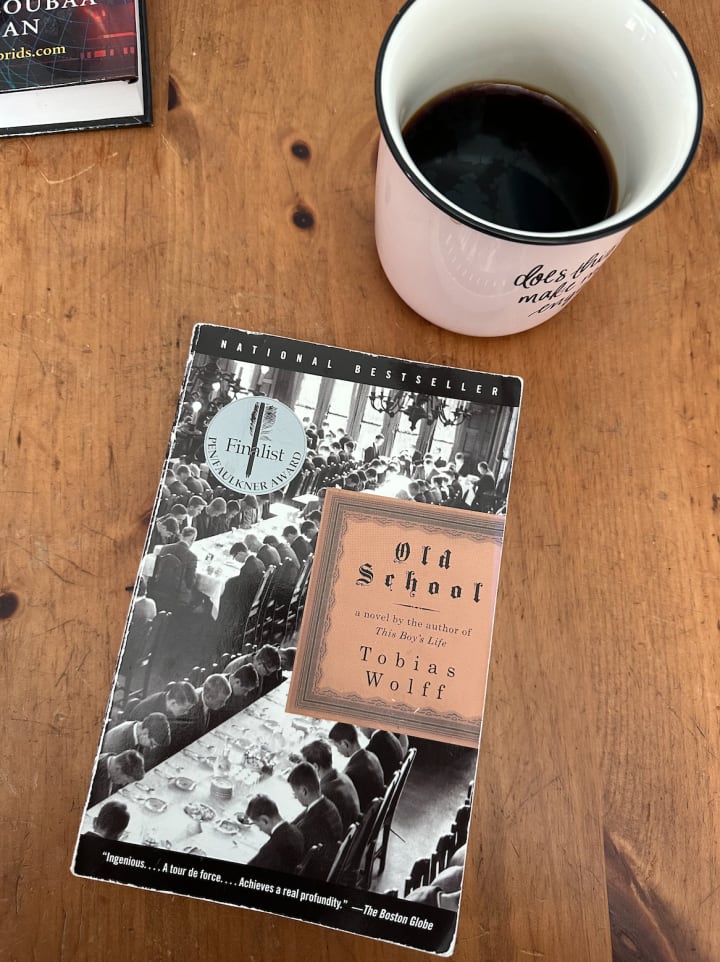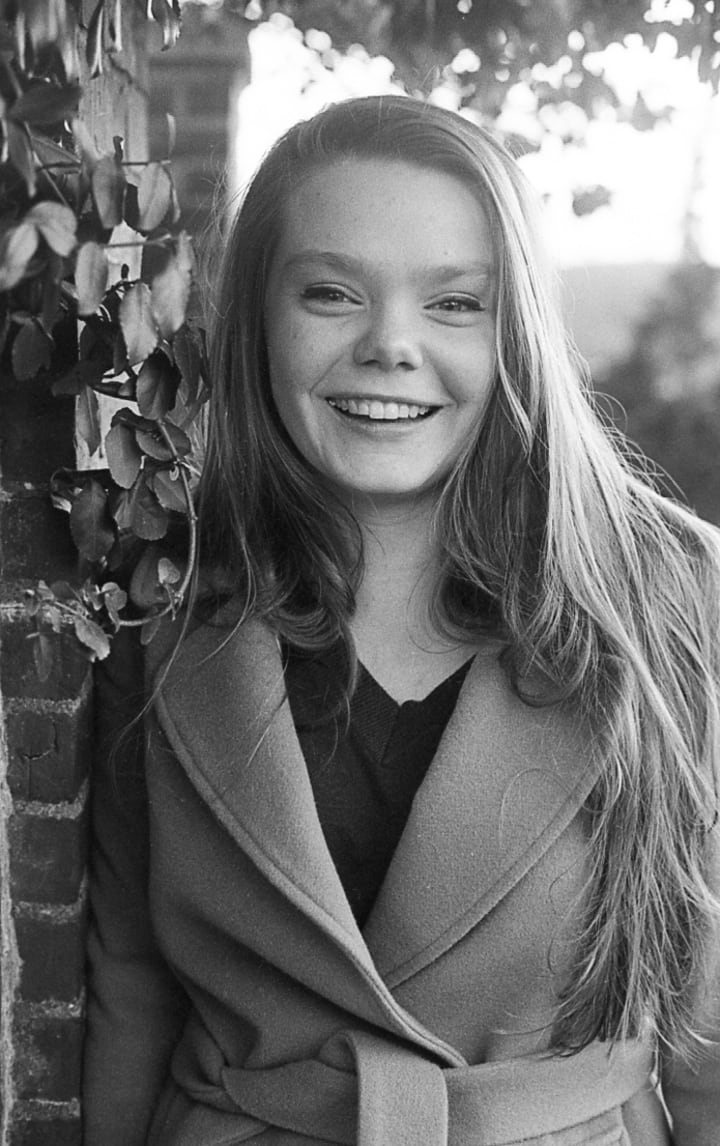Old School
Revisiting Tobias Wolff's book as an older woman.

When I tell people I went to boarding school, they always ask:
"What was that like?"
And I find myself pasting on a smile and saying "Great!" through my teeth. Unless I'm drunk, and then I twist my mouth and say "Complicated."
This summer, I skipped my ten-year high school reunion.
Instead, while visiting my parents I picked out a worn paperback from my bookcase. My mother's copy of "Old School" by Tobias Wolff. She gave it to me when I was still in high school, and I remember enjoying it. On the Acela South, I let it consume me again.

The unnamed protagonist, based loosely on Wolff himself, has three gargantuan tasks before him: the visiting writers, hosted every season by his boarding school. Each author hosts a lecture followed by a private audience with one lucky boy, selected based on the quality of a submitted piece.
In his quest to gain this honor, the boy reads the work of each visiting writer and mimics them. He writes a sparse poem for Robert Frost, and gets too consumed by the head-swelling ego of Ayn Rand to do more than feverishly dream his short story. When his pieces are not selected, the boy joins the jealous outcry of his classmates and commits himself to winning over Hemingway. He retypes copies of Hemingway stories in an attempt to feel the style of his writing, but can't find something of his own to write about.
He knows his story needs to be powerful. Revealing. Excoriating. A story about him, and his life, that is so true and raw that it cannot be ignored. Ultimately, he finds it: already written by a girl from their sister school. He changes the names and little else before submitting her work as his own.

In my sixth form year, I wasn't unlike him. I, too, was a smart child struggling to fit into a very narrow social structure. At that time, writing was like drinking water. It was necessary, easy, rewarding. I won prizes and the praise of teachers, but none of it felt like enough, because I also felt hollow, and my writing reflected it.
The first time I read "Old School," the petty squabbles between him and his fellow classmates were more interesting to me than the book's understructure: the author's battle with himself, and his painful attempts to draw out his own voice. Probably because I was engaged in the same battle, still too close to see its full shape.
I read Elizabeth Bishop, Richard Siken, and Naomi Shihab Nye. My poems, eked laboriously with cluttered prose, were theirs but clumsier. I needed to find my voice. I wanted something bad to happen to me so I would have something real to write about.

Reading from the other side of time, what strikes me now is the intensity of the protagonist's need for recognition. I remember agreeing with him: Yeah, the Frost poem was boring. The Rand story was stupid. His work must have been better. Now, with many rejected submissions and lost challenges behind me, I sympathize less and empathize more.
The attention of adults, the promise of their time, was precious. We outnumbered the staff four to one. All day, we copied their chalkboards and lectures, then followed their drill instructions. The rest of our 'free time' we were patrolled, rarely engaged one-on-one. Weekly dorm meetings were perfunctory, disciplinary. No one met us at our door but a surly roommate.
What your teachers want from you is their voice but younger, so you mold your plastic mind to fit. The process of becoming an individual was tightly controlled. We had a dress code, we had strict honor code rules, we had structures erected around our socialization and our sexuality. When no one asks to hear your voice, it can become a whisper.
It's clearer now, looking back. I was always being told what I was: smart, talented, slutty. None of that felt like me. Who was I? It was a question I wasn't prepared to answer.

My Sixth Form spring, a dorm full of boys built two online brackets: Hotties and Muck Bitches. Thirty girls were listed in pairs on each page, voted off in succeeding rounds.
I was a Monitor, one of eight elected Sixth Form leaders. I was the group's representative on the school honor board, which met one Wednesday night to deliberate the case of the boy whose laptop built the brackets. The Dean stopped me in the hallway.
"You can't come in," he told me, pain flashing over his face. We knew each other well. "The truth is, you're on one of the lists. You would be biased." He wouldn't tell me which list I was on, so I knew.
I left burning with shame and rage. What comforted me was our school handbook, which clearly stated that cyberbullying was a suspendable offense, and repeat offenses (of which this, with multiple voting rounds completed, certainly qualified for) were expellable.
At chapel the next morning, the boy sat in the front row.

So, something bad did happen to me. I don't think it brought me any closer to my voice. All it gave me was a new, more evil name to hiss in my mind: Muck Bitch. Sometimes, I still hear it.
When the protagonist steals his last story, he excuses himself by saying, "Anyone who read this story would know who I was."
This time around, reading it in a sunlit park of the small city I call home, flushed with the news that one of my short stories would be published soon, I felt the click of that knowledge tumbling home. An author's true voice is not the culmination of the pain that we experience, or even a narrative told with the gift of hindsight. It's just the truth, which is at once personal and universal. It's knowledge of the self.
If I had my voice in my Sixth Form year, I would have stood up in that chapel and told everyone what I thought. I would have written an article about the situation for the school paper. I would have written a piece like this long ago. But I didn't.
The stories I write scare me. They're collages of my life, but also the lives of people who I still love and care for. My deepest fear is that someone I respect will read a caricature of their worst day, or their worst self, and think that's the only way I see them. Stories written with a true voice are painful to read, more painful to write and stamp your own name to. It's a type of bravery.
I still don't know if I'm brave.

On Mother's day, I went to brunch with my friend's family. For six years, I've called them my 'New York Family.' After we ordered drinks, I stepped away and called my own Mother. We exchanged pleasantries and I wished her a happy day. I thanked her for raising me to read, to question my world, and for always supporting my writing. A lump grew in my throat.
"I think I'm realizing just how much I missed out on, being away from you." It felt silly to say out loud. We both know the opportunities I had at my boarding school were unmatched, were on the whole more good than bad, had set me on a path to an Ivy League college. "Maybe I would have found my voice earlier."
"Or maybe you would have hated me more," she countered. "And it still would have taken this long."
By the end of "Old School," the protagonist is published, married, has made amends and peace with his guilt. He is invited to return to his old school as a visiting author and chooses not to go. The shadow of his shameful departure so many decades before still hangs over him.
I didn't attend my reunion, not because I'm ashamed of the life I've crafted for myself in the decade since I left. A lot of big boxes have been checked: my work is exciting and starts conversations. I've been published. I'm getting married this Fall.
I didn't attend because I think I still have some work to do on my own voice, the one that knows who I am, who can walk bravely down those old halls and confront the whispers and shadows that live only in my mind now.
Wolff ends "Old School" with this phrase:
"... surely the most beautiful words ever written or said: His father, when he saw him coming, ran to meet him."
He's right. Those are the most beautiful words ever written. How lucky I am to have parents that always open their door to me, and feel closer now than they ever have.
About the Creator
Enjoyed the story? Support the Creator.
Subscribe for free to receive all their stories in your feed. You could also pledge your support or give them a one-off tip, letting them know you appreciate their work.
Reader insights
Outstanding
Excellent work. Looking forward to reading more!
Top insights
Expert insights and opinions
Arguments were carefully researched and presented
Heartfelt and relatable
The story invoked strong personal emotions







Comments (11)
This Is a good piece
What a wonderful and thoughtful story. Your writing style just carries the reader along and shares in such an intimate way. Awesome!💙Anneliese
Please I just wrote my article, kindly rate it for me so that I can do better https://vocal.media/gamers/glory-on-the-pitch
An immersive and thought-provoking read. Kudos to you for writing and sharing!
Excellent writing and a moving, thought provoking, relatable story. Thank you.
Nice 👍 Congratulations on your 🎉Top Story🎉🎉🎉🎉🎉
Excellent storytelling beautifully written. Well done for the TS
This was incredible. I really loved this line -> "Stories written with a true voice are painful to read, more painful to write and stamp your own name to". I feel that so much. You are absolutely brave to have written this. I haven't read Old School but I'm adding it to my reading list. Your description makes it sound well worth a read.
Holy shit. This is absolutely phenomenal. Masterfully structured, weaving together the book with your life experiences. I'm so happy you found the voice to write this. My fingers are crossed for you in this challenge, though I don't think you need my well wishes ;) Well done!!!
I love that picture of you! If that’s a “muck bitch” I don’t even want to know what I was considered at that age. You successfully brought me into a world I know nothing about with this. I’m glad you made the point that no writer or artist has to have something bad happen to them to develop a voice. I’ve observed people going out of their way to create drama for themselves as a form of creative “inspiration”—and then they’re so beat down by life, they have nothing left to give to the creative process. I would say it’s best to cultivate both empathy and a peaceful existence. Then you can write about anything without destroying yourself in the process. “The stories I write scare me. They're collages of my life, but also the lives of people who I still love and care for.” That part. And I rest my case. Your stories and characters are alive because you infuse them with compassion. We have to have compassion for ourselves and others to be storytellers. Otherwise, readers won’t form attachments, or care what happens to the characters. This was a tender, intimate and BRAVE look back at your youth.
Incredible. I was completely captivated by this, Suze, and so so impressed by how you braided Wolff’s book into your account. So many parallels, and I can see how it changed you. “An author's true voice is not the culmination of the pain that we experience, or even a narrative told with the gift of hindsight. It's just the truth, which is at once personal and universal. It's knowledge of the self.” —I completely agree. The best authors I have read use this exactly. Their voice is just the truth, it isn’t machinated, though the techniques may have been learned and cultivated. Wolff is one of my favorite authors. I first read his flash fiction story, “Bullet in the Brain” and it is the best thing I’ve ever read. I contemplated writing my bookclub entry on that story, but is isn’t a book, lol. Anyway, fantastic essay. I am simultaneously in awe of it and mot surprised that it came from you. You are so incredibly talented. 💕👏👏👏 I hope this places, or even wins!! Going to nominate it for TS.